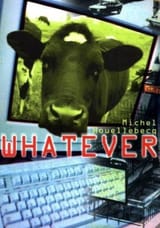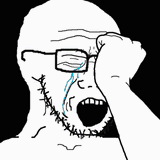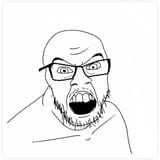Anonymous
7/4/2025, 12:11:44 AM No.24518627
Tired of seeing this book filtered through midwits who think it's just "Le Incel Manifesto". The title is literally the thesis (Extension of the domain of the struggle), you retards. It's not *about* "la misère sexuelle", that's just the final, most brutal battlefield.
The book is a clinical diagnosis of late-stage liberal society.
The Left and Feminism are portrayed as completely fucking useless because they're fighting the last war.
>Feminists in the book are a cope-ideology. The "deux boudins" pretend clothing isn't for seduction because they have zero capital on the seduction market. It's a denial of reality.
>The Left (syndicates, socialists) is obsolete. They're still bickering about wages while the real suffering is metaphysical, affective, and sexual. For the narrator, the strike is a pure nuisance, one more obstacle in an already absurd world. The strikers and their "commandos" are an irrational force that only increases the general entropy. They have literally zero answers for a guy like Tisserand.
The true horror is the "normal" people who are the active agents of this decay.
>Catherine Lechardoy: turns her sexual frustration into raw professional aggression. She extends the struggle herself because it's the only game she can win.
>Véronique: the ultimate product of therapy-culture. "Healed" by psychoanalysis into a black hole of narcissism who sees her ex's suicide attempt as "emotional blackmail" and a "nuisance".
>These aren't villains, they're what the system produces and considers "healthy".
And let's not forget the corporate world, which is just a sanitized version of a fucking knife fight.
>The narrator's job consists of navigating a minefield of petty tyrants and sociopaths.
>Schnäbele isn't a manager, he's a predator marking his territory. He humiliates his subordinates for sport, as a pure display of power. Tisserand is just collateral damage in his pathetic psychodrama.
>The Ministry meetings are a Kafkaesque nightmare. The "Théoricien" wields jargon not to communicate, but to dominate and exclude. Every interaction is a subtle power play, a jab, a move to establish dominance.
>The struggle is so total that even simple human interaction is impossible. The narrator and Tisserand are constantly on the defensive, trying to survive presentations to people who are actively hostile and looking for any reason to tear them down.
>The office is just as much a zone of competition and brutal exclusion as the nightclub. The only difference is that the currency isn't beauty, but bullshit. The atomization of society is proven by the fact that the narrator's professional life is a series of meaningless, hostile encounters with human-shaped obstacles.
The book is a clinical diagnosis of late-stage liberal society.
The Left and Feminism are portrayed as completely fucking useless because they're fighting the last war.
>Feminists in the book are a cope-ideology. The "deux boudins" pretend clothing isn't for seduction because they have zero capital on the seduction market. It's a denial of reality.
>The Left (syndicates, socialists) is obsolete. They're still bickering about wages while the real suffering is metaphysical, affective, and sexual. For the narrator, the strike is a pure nuisance, one more obstacle in an already absurd world. The strikers and their "commandos" are an irrational force that only increases the general entropy. They have literally zero answers for a guy like Tisserand.
The true horror is the "normal" people who are the active agents of this decay.
>Catherine Lechardoy: turns her sexual frustration into raw professional aggression. She extends the struggle herself because it's the only game she can win.
>Véronique: the ultimate product of therapy-culture. "Healed" by psychoanalysis into a black hole of narcissism who sees her ex's suicide attempt as "emotional blackmail" and a "nuisance".
>These aren't villains, they're what the system produces and considers "healthy".
And let's not forget the corporate world, which is just a sanitized version of a fucking knife fight.
>The narrator's job consists of navigating a minefield of petty tyrants and sociopaths.
>Schnäbele isn't a manager, he's a predator marking his territory. He humiliates his subordinates for sport, as a pure display of power. Tisserand is just collateral damage in his pathetic psychodrama.
>The Ministry meetings are a Kafkaesque nightmare. The "Théoricien" wields jargon not to communicate, but to dominate and exclude. Every interaction is a subtle power play, a jab, a move to establish dominance.
>The struggle is so total that even simple human interaction is impossible. The narrator and Tisserand are constantly on the defensive, trying to survive presentations to people who are actively hostile and looking for any reason to tear them down.
>The office is just as much a zone of competition and brutal exclusion as the nightclub. The only difference is that the currency isn't beauty, but bullshit. The atomization of society is proven by the fact that the narrator's professional life is a series of meaningless, hostile encounters with human-shaped obstacles.
Replies:




